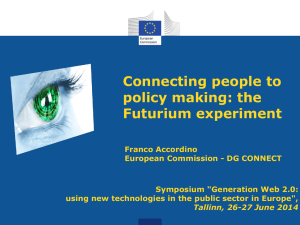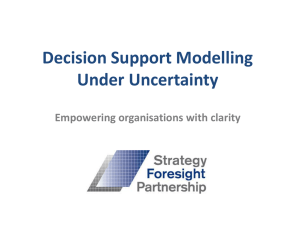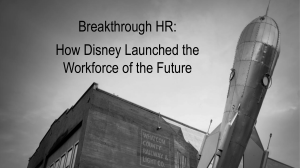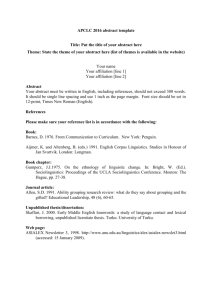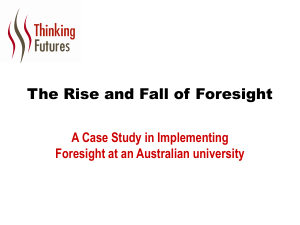Key Trends in the World and European Arena and New Challenges
advertisement
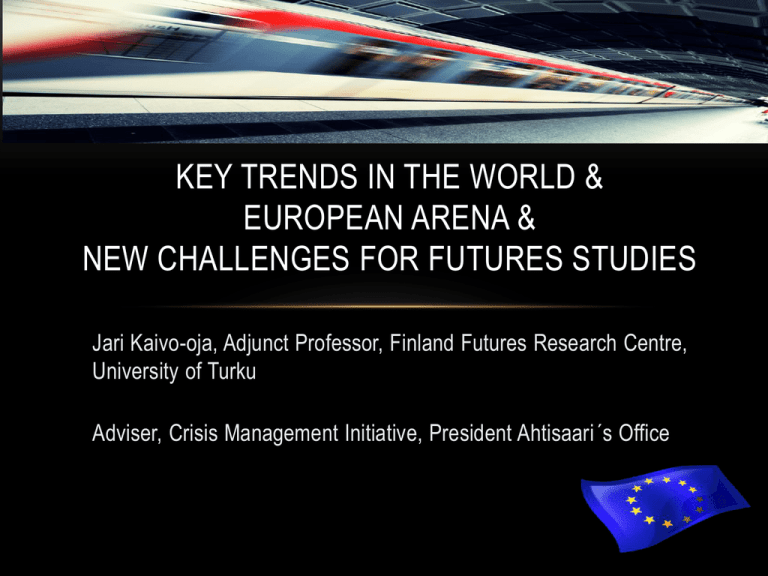
KEY TRENDS IN THE WORLD & EUROPEAN ARENA & NEW CHALLENGES FOR FUTURES STUDIES Jari Kaivo-oja, Adjunct Professor, Finland Futures Research Centre, University of Turku Adviser, Crisis Management Initiative, President Ahtisaari´s Office KEY TRENDS IN THE WORLD: SOCIAL • Global migration increases • Increasing longevity (more active 60 year old) • The old poor class larger/regional underclass • Growing distrust on institutions and leaders • Changing roles of sex and generations • World becomes urban • Continued bubbles and crashes • Global educational powerhouses: China & India KEY TRENDS IN THE WORLD: TECHNICAL • Genetics, robotics, informatics and nanotechnology (WRIN waves) • The era of big creativity and innovation challenges (Rule of 10 000 hours, bohemian creative class, Quartet Helix, frugal innovation, systemic innovations, etc.) • Technological capability increases exponentially: technological singularity near • The Cloud becomes ubiquitous: Web 3.0 and Web 4.0 • New age of transhumanity: Human beings, robots and cyber humans • Reality and universe secondary, multiverse will be the key field of hypercompetition KEY TRENDS IN THE WORLD: ENVIRONMENT • The rules of time, space & materia are changing: time machines, space machines and materia machines create ubiquitous r/evolution • Environmental catastrophes occur • ”Some like it hot”: the climate change problem and the end of cheap energy era • The culture of sustainability begins to emerge KEY TRENDS IN THE WORLD: ECONOMIC • Globalisation: Networks, crowds, markets • The emerging BRICSA economies, especially China will dominate many markets • Digital markets, digital money, virtual words, avatars • Productivity gains: More automation, highly educated workers • Mega-companies & micro-entrepreneurs emerge • Agile and smart business organisations EUROPE 2030 VISION? PROJECT EUROPE 2030 Challenges and Opportunities A report to the European Council by the Reflection Group on the Future of the EU 2030 Web: http://www.reflectiongroup.eu/wp-content/uploads/2010/05/reflection_en_web.pdf EUROPE 2030? • Vision element 1: An agent of change in the world, a trendsetter, and not a passive player or witness. • Vision element 2: Highly competitive and sustainable social market economy in order to maintain social cohesion and fight against climate change. • Vision element 3: EU needs to have a common energy policy (Renewables & nuclear energy solution). • Vision element 4: Europeans have met its demographic challenge. EUROPE 2030 • Vision element 5: The EU has a strong Single Market against temptations of economic nationalism and complete it to include services, the digital society and other dynamic sectors. • Vision element 6: Improved European tax coordination. • Vision element 7: Europe will have very modern labour market and very modern corporate governance practices because of the progress of robotisation and automatisation. EUROPE 2030 • Vision element 8: The stronger European Council and the stronger Eurogroup with more efficient leadership role, in coordination with the Commission and the European Parliament. KEY EUROPEAN QUESTIONS ON THE EUROPEAN FORESIGHT AGENDA • Manage financial crisis and re-direct Europe to new economic growth • Solve unemployment problems – especially youth unemployment problem • Keep Europe competive, innovative and open minded (Technology, Talents, Tolerance) • Keep Europe secure and safe: internal security, external security, social security, energy security etc.) • Make political leadership transparent and efficient NEW CHALLENGES FOR FUTURES STUDIES • Diagnosis-Prognosis-Prescription Methodology (DPP Methodology) • Adaptive and Agile Foresight processes • Strategic and participatory foresight more widely used • Foresight supports strong democracy • Metaforesight activities • Foresight and social media ... later European Cloud foresight capacity ATTENTION ! CONGRATULATIONS FOR EMINENT SCHOLAR, PROFESSOR ERIK TERK AND ESTONIAN ACADEMIC COMMUNITY & FUTURES RESEARCH FELLOWS ! THANK YOU! SOME REFERENCES • Gratton, L. (2011). The Shift. The Future of Work Is Already Here. London: Collins. • Green, E.N. (2010). Anywhere. How Global Connectivity Is Revolutionizing the Way We Do Business? New York: McGrawHill. • Greenfield, A. (2006). Everyware: The Dawning Age of Ubiquitous Computing. Berkeley, CA, New Riders. • Inkinen, S. & Kaivo-oja, J. (2009). Understanding Innovation Dynamics. Aspects of Creative Processes, Foresight Strategies, Innovation Media and Innovation Ecosystems. Finland Futures Research Centre. Turku School of Economics. eBook 9/2009. Turku. • Kaivo-oja, J. (2006). Towards Integration of Innovation Systems and Foresight Research in Firms and Corporations. The Classical Takeuchi-Nonaka Model Reconsidered and Reformulated. FFRC-publications 2/2006. Turku, Turku School of Economics. • Kaivo-oja, J. (2011). Futures of Innovation Systems and Systemic Innovation Systems: Towards Better Innovation Quality with New Innovation Management Tools. e-Book No 3, Finland Futures Research Centre, Turku, University of Turku. • Kaivo-oja, J. (2012). Weak Signals Analysis, Knowledge Management Theory and Systemic Socio -cultural Transitions. Futures. The Journal of Policy, Planning and Futures Studies. Vol. 44, Issue 3, pp. 206 –217. • López, T.S., Ranasinghe, D.C. Harrison, M. & McFarlane, D. (2012). Adding sense to the Internet of Things: An architecture framework for Smart Object systems. Personal and Ubiquitous Computing. Vol. 16, No 3, 389 -395. • Misuraca, G., Broster, D., Centeno, C., Punie, Y., Lampathaki, F., Charalabidis, Y., Askounis, D., Osimo,, D. Katarzyna, S. (2010). Envisioning Digital Europe 2030: Scenarios for ICT in Future Governance and Policy Modelling. Seville: JRC. • Teece, D.J. (2006). Reflections on ‘Profiting from innovation`. Research Policy. Vol 35, No. 8, pp. 1131-1146. • Ulwick, A. (2005). What Customers Want: Using Outcome-Driven Innovation to Create Breakthrough Products and Services. New York, McGrawHill. •
